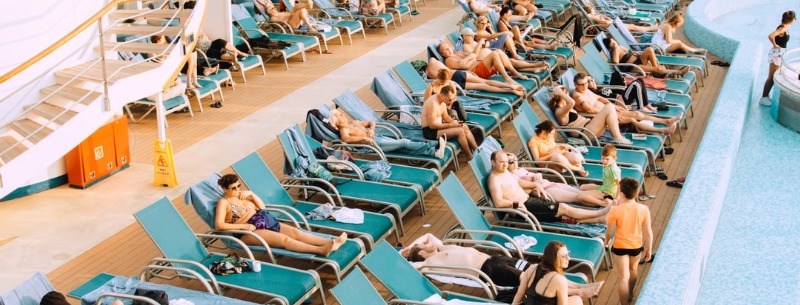How do you avoid getting sick on a cruise?
Amidst the fanfare of your ship setting sail for exotic destinations are considerations to make sure that you stay healthy on what can be the trip of a lifetime. The allure of a cruise – new activities every day, visiting multiple destinations, and quality food and buffets – are also the same things that can be hazardous to your health unless you are prepared. Cruise travelers can be exposed to or suffer from norovirus, swine flu, respiratory viruses, seasickness, dehydration, and hangovers so taking a few extra steps is well worth it.
Vaccines
Since many destinations for cruise ships include places that do not practice routine vaccination, make sure that you are up to date on all of your vaccines: measles/mumps/rubella, varicella, and seasonal flu. Diseases that are not common in the USA can be prevalent elsewhere so a quick checkup with your primary care doctor ensures your vaccines are current.
Depending on your destination, there may be additional requirements for vaccines so be sure to check in advance with your cruise line to see what you need.
Norovirus & Gastrointestinal Disorders
Noroviruses are a group of viruses that cause symptoms to a “stomach flu”, “stomach bug”, or gastroenteritis, but getting a flu shot will not prevent it. The Norwalk virus or Norovirus has become more prevalent on cruises, due to close conditions on a cruise ship and how contagious the virus is.
According to the CDC: Norovirus is a very contagious virus that can infect anyone. You can get it from an infected person, contaminated food or water, or by touching contaminated surfaces. The virus causes your stomach or intestines or both to get inflamed. This leads you to have stomach pain, nausea, and diarrhea and to throw up.
While outbreaks of Norovirus get a lot of press, when you compare the number of people cruising ( Last year 14 million passengers including 1.3 million children sailed on cruises from American ports.) to the number of outbreaks (In 2011, there were 14 major outbreaks involving several thousand passengers and crew. ), chances are that you will not encounter an outbreak.
How can you take steps to protect yourself from Norovirus or other gastrointestinal issues?
- The best way to prevent illness is frequent handwashing with soap and water. Wash your hands before eating and after using the bathroom, changing diapers, or touching things that other people have touched, such as railings & door handles.
- Use alcohol-based hand sanitizer (containing at least 60 percent alcohol) as an extra step of protection. Many shops have hand sanitizer dispensers located throughout the cruise ship.
- At Ports of Call, especially in developing countries, follow basic food and water precautions: “eat only food that is cooked and served hot, drink only beverages from sealed containers, avoid ice, and eat fresh fruit only if you have washed it with clean water and peeled it yourself”.
- Beware of Drinking the Water – Check the U.S. State Department‘s website for country-specific travel warnings; the section on “Medical Facilities and Health Information” will mention any restrictions on drinking water.
- Close toilets before flushing.
Respiratory & Other Health Concerns
As with Norovirus, respiratory illnesses can spread rapidly on a ship. The CDC is not only involved in setting guidelines for cruise ships on sanitary practices and Norovirus, but it also provides Guidance for Cruise Ships on Flu-Like Illnesses.
A few tips to protect yourself from Respiratory Illnesses on Cruise Ships:
- As mentioned above, a seasonal flu shot may offer an extra defense
- Frequent hand washing and use of hand sanitizers should be part of your daily hygiene habits
- Cough or sneeze into a tissue (not your hand)
Have Fun and Use Common Sense
Being on vacation means different eating, sleeping, and activity patterns. Get a lot of rest, stay hydrated, and try to eat as healthy as possible. We know those cruise ship buffets are like a siren call! Check out our tips on How to Eat Healthy on a Cruise to maintain a smart and yummy diet while at sea.
Bring your sunscreen (SPF 30+) and continually apply throughout your day. Spending days in your cabin recovering from sunburn would not be the optimal cruise experience.
There are some all-natural ways to combat seasickness: green apples, wear acupressure wristbands, head outside for fresh air, look at the horizon, or book a low-deck, mid-ship cabin. Speak with your doctor prior to the cruise to get advice if you have concerns about seasickness.
Our most important tip of all? HAVE LOTS OF FUN!
